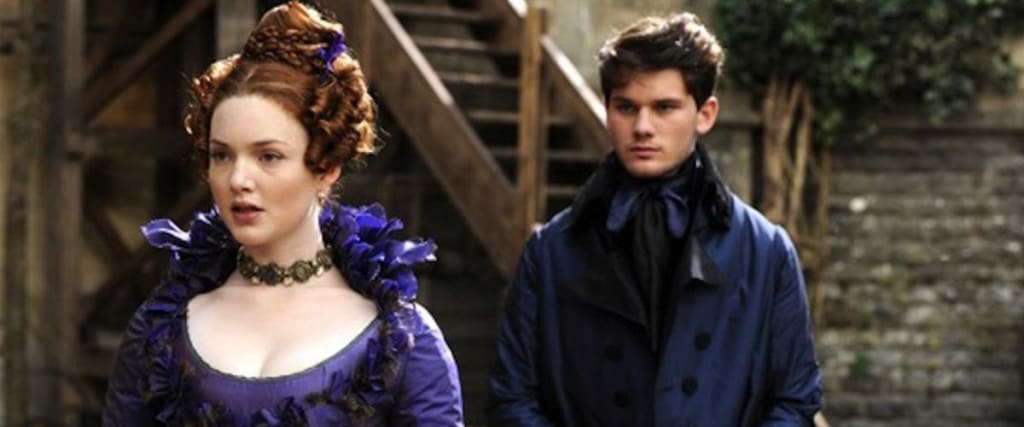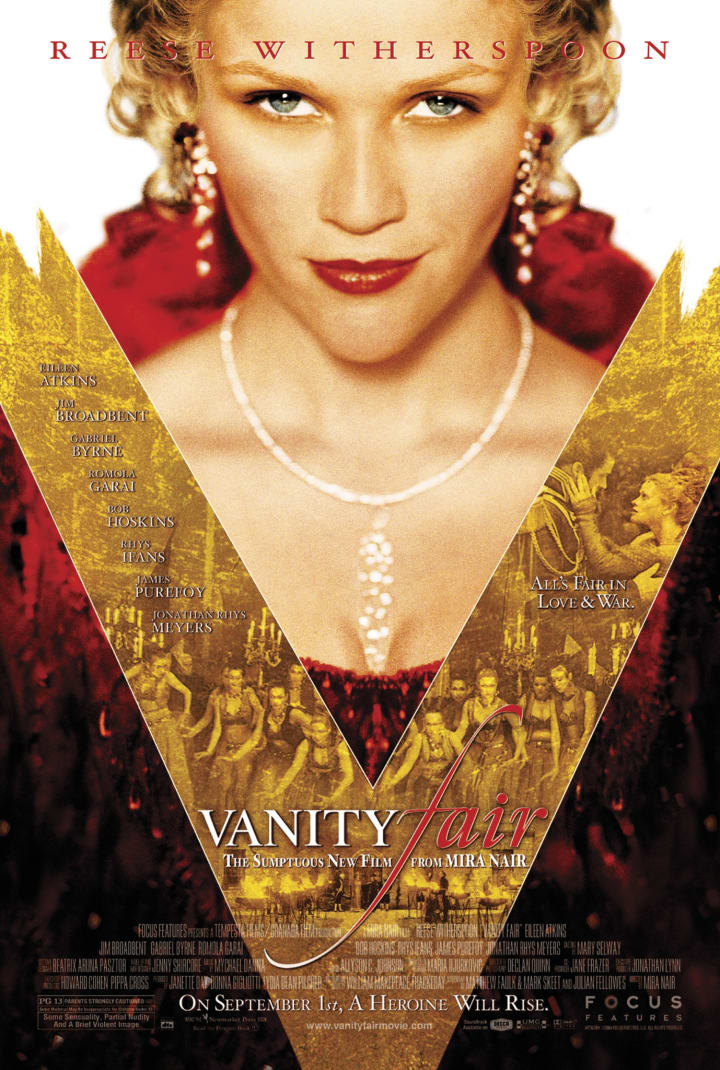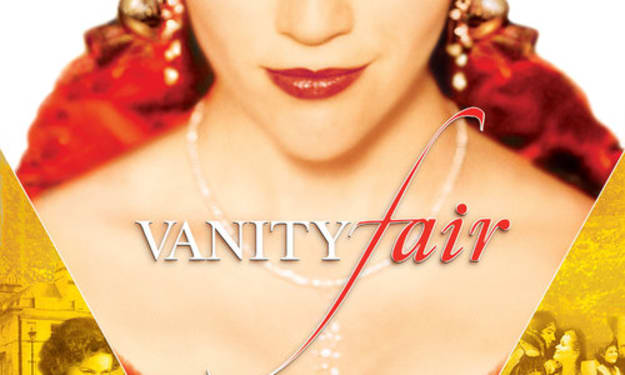Literary Essay #1: 'Pride and Prejudice,' 'Vanity Fair,' and 'Great Expectations'
How Social Class, Self-Improvement, Love, and Happiness All Intertwine in the Works of Austen, Dickens, and Thackeray

Early nineteenth-century England was a country rigidly divided by social class. Whether or not you were “common” (from a low social status or with poor breeding) or genteel (from a high social class or with good breeding) defined how society at large saw you. Those born without wealth or a title envied those who were and did whatever they could to improve their lives through business, education, marriage, or by good luck. No matter how hard a person strived to make a fortune and get ahead, they would never be quite accepted by the upper-crust, who dismissed the socially mobile nouveau-riche as common and immoral. Often the snobbery of the aristocracy was a front to hide their own shortcomings. The themes of social advancement, morality, and the hollowness of wealth and status are themes which come into play in the novels of Austen, Dickens, and Thackeray.

Jane Austen’s Pride and Prejudice famously begins with the sentence “It is a truth universally acknowledged that a single man in possession of a large fortune must be in want of a wife” (Austen 1), which sets up the novel’s theme of wealthy and eligible gentlemen being fair game for husband-hungry young ladies. Elizabeth Bennet, the heroine of Pride and Prejudice, comes from a genteel but not wealthy family which contains only daughters. Their estate is entailed, meaning that it will go to the nearest male relative which Mr. Bennet (Elizabeth’s father) dies, since an entailed property cannot be inherited by a woman. To avoid poverty, the Bennet sisters must marry well and introducing them to eligible suitors is the obsession of their mother. Mrs. Bennet is painted as flighty and ridiculous but her efforts to throw her daughters in the path of wealthy men are well-intentioned. For all her faults, Mrs. Bennet wants what's best for her daughters: to marry well and have a comfortable life.
Mr. Darcy is introduced into the novel as a man with a large fortune and a vast estate, two qualifications which make him ideal husband material. Elizabeth begins to realize her love for Darcy and his suitability as a marriage partner during a visit to Pemberley, his estate. Pemberley, like Darcy himself, is large, grand, and handsome and becoming the mistress of such an estate would have been a triumph for Elizabeth. It is during this visit that Elizabeth learns of Darcy’s good qualities (loyalty towards his friends Mr. Bingley and Colonel Fitzwilliam; affection for his sister, Georgiana; and fairness and generosity in how he treats his servant and tenants), which she had previously overlooked, and that she returns his affections. Darcy’s wealth and his upright character, Elizabeth’s love for him, and her desire for an advantageous marriage are all tied up with one another.
Elizabeth Bennet is presented as being better than her supposed social superiors. She is beautiful, intelligent, witty, vivacious, and sensible and outshines her rivals for Darcy’s hand: Caroline Bingley (who is snobbish and mean-spirited) and Anne de Bourgh (who is sickly and insipid) who both come from more socially prominent families than the Bennets. There is an implication that becoming Mrs. Darcy and mistress of Pemberley is Elizabeth’s reward for her good qualities.

William Makepeace Thackeray debunks the idea wealth and status are the rewards for someone’s virtues and that they are worth obtaining in the first place. Becky Sharpe, the anti heroine of Vanity Fair, comes from a much lower and much less respectable background than Elizabeth Bennet. As the daughter of a dissolute artist and an opera dancer (which to polite society would have been seen as little better than a prostitute) and grew up with little financial security. Her early experiences with poverty and ignominy have formed Becky into a selfish and single-minded person who thinks of nothing but improving her social position and avoiding poverty. Unlike the virtuous Elizabeth, who receives a rich husband and a luxurious home because she deserves it, Becky is amoral and though she tries to charm, lie, cheat, and possibly sleep and kill her way to the top, she never quite makes it. The glittering life that she and her husband Rawdon lead as the toast of whatever society they are apart of is only a front which hides the fact they are perpetually broke. Their lifestyle is funded by cheating their friends at cards, not paying their servants, landlords, and creditors, and getting whatever they can from Becky’s sugar daddy, Lord Steyne. After Rawdon leaves her, Becky finds herself right back where she started: a dissolute and down on her luck bohemian, a life that that free-spirited and flamboyant Becky is perhaps better suited for and which is perhaps the happiest part of her life.
Becky uses her underprivileged upbringing to try to justify the immoral things she does to survive and the ways she backstabs the people around her to get ahead:
"I think I could be a good woman if I had five thousand a year." [...] And who knows but Rebecca was right in her speculations--and that it was only a question of money and fortune which made the difference between her and an honest woman?” (Thackeray 38)
Thackeray appears to disagree with Becky’s assumption that a bad character is a result of unfortunate circumstances. Vanity Fair is filled with characters who are wealthy and privileged but morally bankrupt, such as the miserly and misanthropic Mr. Osborn, who turns against his friend Mr. Sedley after Mr. Sedley loses all his money and later ignores his widowed daughter-in-law Amelia (who is Mr. Sedley’s daughter), forcing her and her son to live in poverty; Sir Pit Crawley, Becky’s crude and lecherous father-in-law, and the Marquis of Steyne, a fabulously wealthy but immoral and dissolute nobleman who gets between Becky and her husband Rawdon. The high society Becky longs to join is rotten to the core, despite its gilded exterior. Aristocratic titles such as “Steyne” and “Bareacres” are meant to show the decay of the English nobility. Thackeray’s implication is that the ranks of the upper classes are not worth the lengths that Becky takes to join them and joining them will not make Becky happy.

Like with Elizabeth Bennet, the social aspirations of Pip, the protagonist of Great Expectations by Charles Dickens, are tied up with their feelings for a haughty and seemingly out of their league love interest. Pip’s first glimpse of a life beyond the humdrum, working-class existence he was born into is when he is summoned to Satis House, the dilapidated but glamorous home of Miss Havisham, a wealthy, eccentric, and bitter old woman, and Estella, her beautiful and cold-hearted ward. Though she treats Pip cruelly and dismisses him as a “common, laboring boy,” Pip falls deeply in love with Estella and longs to become a gentleman in order to win her approval. He becomes dissatisfied with his surroundings and with the life mapped out for him as a blacksmith’s apprentice. As a man, Pip has more opportunities for self-advancement than just marrying well or receiving an inheritance. Though Pip does not get the life he wants, he does manage to rise above the life he was born into. Instead of an independently wealthy gentleman of leisure, he ends the novel as a partner in a prosperous company, an opportunity which would not have been available to Elizabeth Bennet or Becky Sharp.
Pip is presented as a sympathetic and good-hearted character. His desire to improve himself and get beyond the poverty and ignorance he was born into is understandable and even noble. Pip’s main character flaws are that he is naive and misguided. When his fortunes are changed and his whisked away to London to live the life of a gentleman, he gets swept up in the trapping of his new wealth and neglects the few good people in his life (Joe, his coarse but good-hearted brother-in-law, and Biddy, his friend-zoned childhood companion) in order to win the approval of people who will never appreciate him (like Estella).
Estella represents everything that Pip wants out of life. It is to win her approval and be worthy of her love that Pip wants to become a gentleman. She also represents how elusive and hollow his hopes are. The people around Pip, even Estella herself, tell Pip that she is unworthy of his devotion. Estella was raised by Miss Havisham to be cold, haughty, and irresistible to men, so she can break their hearts. She warns Pip that he is wasting his time being in love with her because she lacks the ability to return his feelings: “Oh! I have a heart to be stabbed at stabbed in or shot in, I have no doubt,” said Estella, “and of course, if it ceased to beat I should cease to be. But you know what I mean. I have no softness there- no- sympathy- sentiment- nonsense” (Dickens 237). The name Estella means star, something that is brilliant and beautiful but distant and unobtainable.
Another of Pip’s biggest faults is his tendency to over-idealize things. At his core, Pip is an idealist and a romantic. He wants beauty and glory in his life and wishes the people and circumstances in it were better than they are which causes him to take the few decent people in his life (like Joe and Biddy), be too eager for validation from people who look down on him (like Miss Havisham and Estella), and long for things which are impossible (like becoming a gentleman and winning Estella’s love.) Throughout the novel, he sees Miss Havisham as his fairy godmother and Estella as a princess; a view of them he holds throughout most of the novel. His unexpected elevation to the rank of a gentleman is apparent confirmation of this assumption: believes that Miss Havisham is the one who had given him a fortune and an opportunity to be educated as a gentleman in order to make him a potential husband for Estella. Pip is disillusioned when he finds out that he owes to good fortune to the lowly convict Abel Magwitch, who so happens to be the father of the haughty and class-conscious Estella, meaning she comes from even commoner stock than himself. Throughout the novel, Pip is told that he has “great expectations,” meaning that he will someday come into a large inheritance. The term “great expectations” could also refer to the unrealistic hopes that Pip has for his life and the people around him, which they cannot live up to.
Austen, Dickens, and Thackeray criticize the class-conscious society they lived in by showing that one's social position does not correlate to their worth and that achieving wealth and status does not make one happy. Vanity Fair and Great Expectations, in particular, show that “all that glitters is not gold” and that what you think you want and what you really need can be two different things.
Works Cited
Austen, Jane. Pride and Prejudice. New York: W.W Norton & Company, 2016. Print.
Dickens, Charles. Great Expectations. London: Penguin Group, 2003. Print.
Thackeray, William Makepeace. Vanity Fair. London: Penguin Group, 2004. Print.
About the Creator
Rachel Lesch
New England Native; lover of traveling, history, fashion, and culture. Student at Salem State University and an aspiring historical fiction writer.






Comments
There are no comments for this story
Be the first to respond and start the conversation.